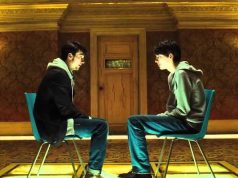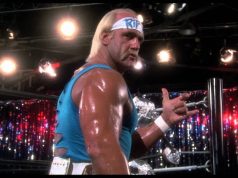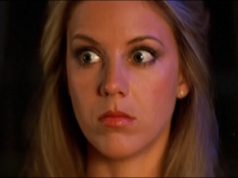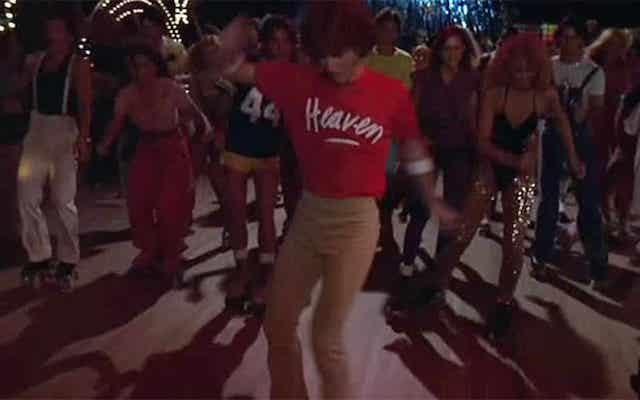
In the past, when people have asked for suggestions of movies they should watch to satisfy their cravings for roller-skating, disco, bony teenagers, and the girl from “The Exorcist,” I’ve been at a loss for answers. But now I have one! “Roller Boogie” meets all of those criteria, with the added bonus of feeling twice as long as it is. When you’re done watching it, only 103 minutes have passed — but it feels like three hours! That’s a bargain.
The reason this perspiring chunk of late-1970s cheese overstays its welcome is that its plot could easily be contained in a single 45-minute episode of a TV drama, yet is padded out to an hour and 43 minutes by the obscene overuse of roller-skating musical numbers. This, in turn, is because the filmmakers hired an actual competitive artistic roller-skater — which is totally a thing — to play the male lead opposite Linda Blair, and they wanted to get their money’s worth. Competitive artistic roller-skaters don’t work cheap! I mean, they do, but still, there’s no reason to waste money.
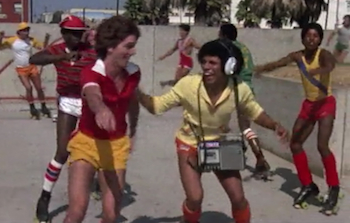
“Roller Boogie” is set in Venice Beach, Calif., where the teens are all emaciated and spend their summer days cruising around on their roller skates, clad in tank tops and those tiny, loose-fitting shorts that people wore in the late ’70s. Seriously, the shorts are barely even there, and everybody’s hopping around, doing the splits and stuff. I bet a lot of the footage they shot for these scenes was unusable because guys’ junk kept falling out.
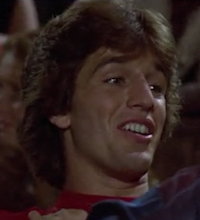
Anyway, the best skater in town is Bobby, a toothy, feathery-haired dimwit played by competitive artistic roller-skater Jim Bray in his only film appearance. Bobby and his pals live a life of constant skating, either on the boardwalk near the beach or at their favorite indoor skating rink, called Jammer’s, but Bobby has greater aspirations: He wants to compete in the Olympics. The fact that there are no roller-skating events in the Olympics does not dissuade him, nor does the movie acknowledge it. If you dream hard enough, you can make it happen!
One night at Jammer’s, Bobby meets Terry Barkley (Linda Blair), a rich girl from Beverly Hills whose parents want to send her to Juilliard to play the flute but who really just wants to roller skate. When Terry sees how good Bobby is at skating, she offers to pay him for lessons, leading to a flirtatious relationship marked by dialogue such as this:
TERRY: The Olympics? That’s a lot to bite off.
BOBBY: I’ve got a big appetite.
TERRY: I guess you do!
WHAT DOES THAT EVEN MEAN??
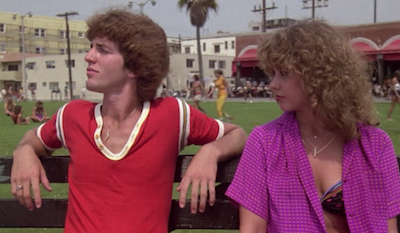
Terry and Bobby skate a lot, accompanied by dozens of extras performing intricately choreographed maneuvers, all of it set to disco songs, many of them written specifically for the movie — because if there’s one thing better than disco music, it’s homemade disco music. It’s difficult to imagine that there was ever a time when audiences craved disco-oriented roller-skating sequences, and yet “Roller Boogie” stands as a testament that they did, or at least that someone thought they did. The movie tries to make it look like it has other things on its mind by making Terry and Bobby have lovers’ quarrels, but you can tell the movie’s heart’s not in it. “Just let them keep roller skating!” is what I imagine the director would have said, if the movie had had a director.
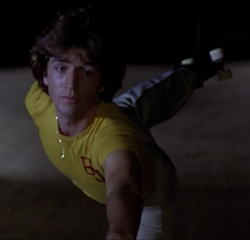
After ten or eleven hours of nonstop roller-skating footage, the movie stumbles accidentally into a plot. Jammer, the curly-mustached owner of the hangout that bears his name, is being shaken down by goons who want him to sell the place to a developer. Bobby, Terry, and their friend Phones (Stoney Jackson) overhear the conversation, and Phones — whose defining characteristic is that he’s always wearing headphones and carrying around a tape recorder — accidentally records it. For real, accidentally! Just happens to lean on the “record” and “play” buttons at the right time, and later the “stop” button, without noticing what he’s done, like Nixon’s secretary with the Watergate tapes. Jammer sells to the goons and is sad, so Bobby performs a solo artistic-roller-skating number for him to cheer him up. It doesn’t work, though, because the only thing sadder than being forced to sell your business to goons is being forced to watch a skinny teenager do interpretative dance on roller skates. This has been verified by mental health professionals.
Then Terry’s snobby, neglectful parents make her do a flute recital at their swanky backyard party, and Terry invites her new roller-skating friends, who naturally stick out like sore thumbs among the upper-crust types, and somehow everyone falls into the swimming pool, for hilarity. To make matters worse, when Terry asks her lawyer dad to help Jammer avoid selling the skating rink, he must refuse because he is the goons’ attorney. But the kids eventually discover the tape recording that Phones accidentally made, the deal is declared invalid, and Jammer’s stays open! Hooray! The end!
BUT NOT SO FAST! The movie is over, really, but then it remembers that there was going to be a “roller boogie” contest, and now that Jammer’s is saved, the contest can go on. Can’t it go on without us, though? Like, after we leave? Terry and Bobby are going to win, right? We already know that. We don’t need to see it. We’ve seen plenty of roller skating, thank you. Let’s just make it clear the contest is going to be held, and run the closing credits, and let us imagine how it turned out– ugh, OK, fine, now they’re having the contest and making us watch. By the time the movie is actually over, the ’70s have ended, thus canceling out every possible reason for the movie to exist.
— Film.com


